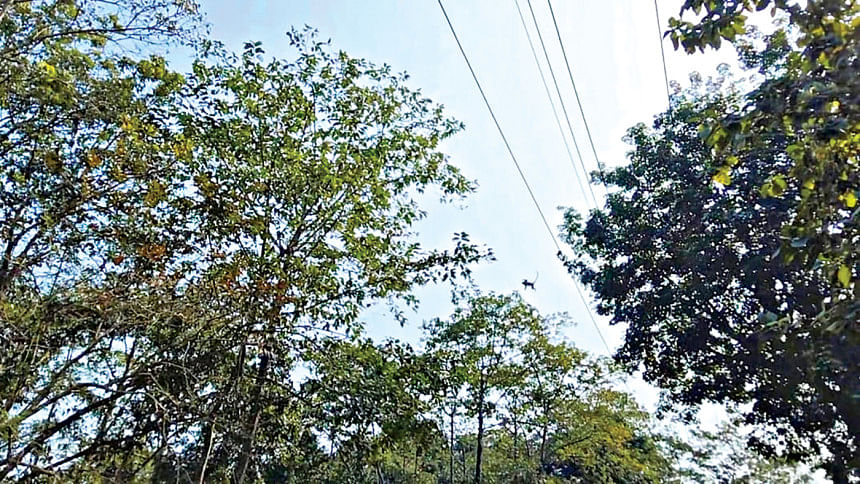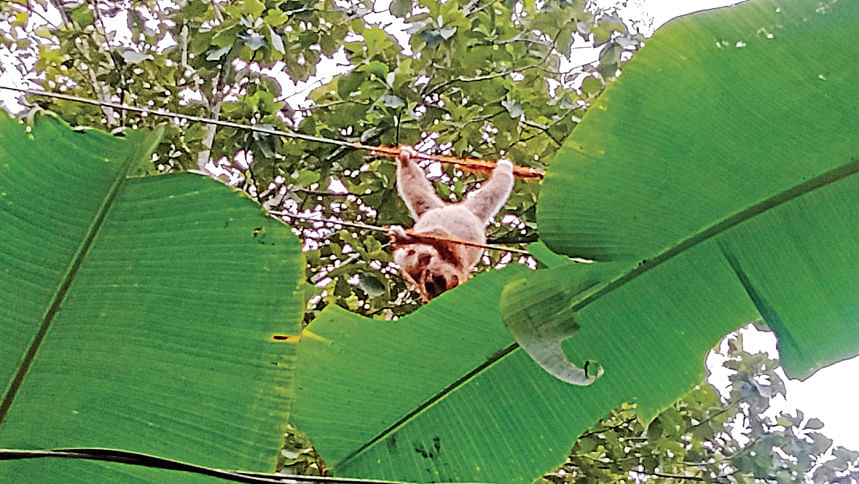A deathtrap for wildlife

At least 10 endangered primates, including seven Phayre's Langurs (Trachypithecus phayrei) and three Spectacled Langurs (Semnopithecus entellus), have died of electrocution since May 2024 in Moulvibazar's Juri and Barlekha ranges, raising serious concerns among conservationists.
The latest incident occurred on May 12 near the main gate of Madhabkunda Eco Park, where the body of an adult Phayre's Langur was found. Similar deaths were reported on March 31 and April 26 this year in the same area.
Forest officials and environmental activists identified uninsulated electrical lines running through key monkey habitats as the cause behind these recurring fatalities.
According to the Forest Department, a stretch of road about 0.5 kilometres adjacent to the main gate of Madhabkunda Eco Park serves as a vital habitat for endangered monkeys.
Several primates have been electrocuted by low-hanging or exposed power lines along this corridor.
So far this year, three more Phayre's Langur have been found dead in the Lathitila forest area, with another discovered in Binandapur -- bringing the total number of primate deaths in the region to 10 since May last year.
"If this continues, we fear Lathitila and Madhabkunda forests may soon lose their remaining wildlife. The biodiversity of the area is under severe threat," said environmentalist Abid Hussain.

"In 2023, the Forest Department submitted a formal request to the Barlekha zonal office of Moulvibazar Palli Bidyut Samiti to insulate all power lines passing through forest areas, but no substantial action has been taken," he said.
Sabit Hasan, lead researcher of the Shy Monkey Research and Conservation Project, said multiple threats are contributing to the species' decline, including indiscriminate deforestation, trafficking, use in traditional medicine, hunting, and electrocution.
He also warned that the removal of tree canopies along roads is increasing the risk of accidents for arboreal animals.
"To protect these endangered monkeys, electric wires inside forests must be wrapped with non-conductive materials such as rubber, and the canopy connectivity between roadside trees must be preserved. Additionally, future forestation efforts should prioritise planting gum-yielding trees, which are a vital food source for shy monkeys," he said.
Contacted, Dr Jahangir Alam, divisional forest officer of Wildlife and Nature Conservation in Sylhet, said the local forest office was not officially informed about the latest incident. "However, I have written to REB several times requesting them to insulate the open wires. They have promised to do so in phases. I will be following up with them again. We do not want to witness further wildlife deaths," he added.
Khursed Alam, a spokesperson for the Patharia Wildlife Conservation Team, said the recent deaths of endangered shy monkeys and spectacled langurs due to electrocution in Moulvibazar's protected forest areas are not only tragic but indicative of a systemic failure in wildlife management and infrastructure planning.
"Electricity infrastructure must coexist responsibly with nature. Wildlife habitats are not secondary to development; they are essential to the ecological balance and biodiversity of our nation. If prompt action is not taken, we may soon witness the irreversible loss of species that once thrived in our forests," he said.
ABM Mizanur Rahman, general manager of the Moulvibazar Palli Bidyut Samiti office, said he had received the letter.
"People need to be given electricity. Wild animals also need to be preserved. We are investigating the issue and have visited the spots. After surveying in this regard, steps will be taken for non-conductive electrical wiring."

 For all latest news, follow The Daily Star's Google News channel.
For all latest news, follow The Daily Star's Google News channel. 



Comments